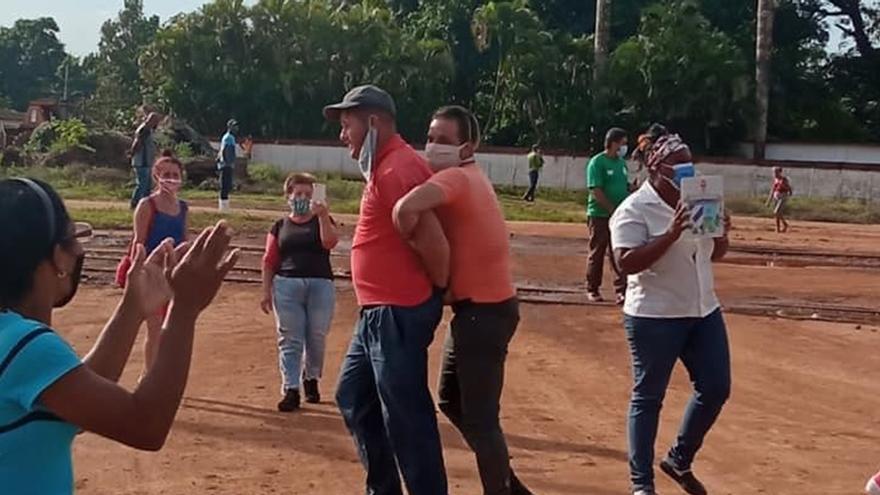
![]() 14ymedio, Havana, October, 26, 2021 — Nairobis Schery Suárez, the wife of Manuel Cuesta Morúa, disappeared around midday on Monday, according to information received through the social media accounts of Mathadela Tamayo, who was alerted by the opposition leader of the Council for a Democratic Transition in Cuba. As of late Monday, Suárez was still not responding to phone calls and her phone was off, unusual behavior for her. However, nothing has changed this Tuesday and this morning her family is still unaware of her whereabouts.
14ymedio, Havana, October, 26, 2021 — Nairobis Schery Suárez, the wife of Manuel Cuesta Morúa, disappeared around midday on Monday, according to information received through the social media accounts of Mathadela Tamayo, who was alerted by the opposition leader of the Council for a Democratic Transition in Cuba. As of late Monday, Suárez was still not responding to phone calls and her phone was off, unusual behavior for her. However, nothing has changed this Tuesday and this morning her family is still unaware of her whereabouts.
If a detention is confirmed, Suárez would be one of the most recently affected by the growing hostility that the state has displayed toward anyone who supports in small or large part the Civic March for Change scheduled for November 15.
After images of regime sympathizers armed with sticks and rifles emerged Monday in “defense of the Revolution”, the offensive has continued, unstoppable, through the bellicose language of state media officials.
The website Cubahora evokes an episode which occurred 62 years ago during which Camilo Cienfuegos “affirmed to defend Fidel and the homeland unconditionally.” Since narrating the event, which recalls the emergence of national militias, the columnist made a call to continue the task.
“Today, the circumstances for the Revolution remain just as complex and the defense of the Homeland continues to be the highest priority for maintaining its conquests intact, though the combat theaters have been modified and the ideological, on social media, gains prominence.”
In the daily from Santiago, Sierra Maestra, they did not avoid employing unsettling militaristic language throughout the column: Morir por la patria es vivir [To die for the homeland is to live].
In that piece, the opposition is accused of appropriating the “patria y vida“ [homeland and life] slogan, which they attribute to Fidel Castro, and praise what they consider the true meaning of the more recognized words of the ex-ruler: “patria o muerte” [homeland or death].
Luis Alberto Portuondo Ortega, author of the text, signaled the importance throughout history of giving one’s life and fighting imperialism and colonialism and offered as an example the U.S. war of independence from the United Kingdom or of Cuba with respect to Spain. “The history of humanity shows how entire people have preferred to immolate themselves, rather than be enslaved.”
These texts are in addition to those published yesterday in Escambray and replicated in various state media with the title Las máscaras caen, in which they once again attacked playwright Yunior García, one of the main spokespeople of the group Archipiélago, with the same accusation repeated throughout the last year: of having participated in a workshop in a private university in Madrid called “Dialogues on Cuba” which presumably included training courses to promote non-violent political change, like those which inspired the color revolutions in Europe toward the end of the 20th century or the Arab Spring this past decade.
The note also mentions the presence of Reinaldo Escobar, editor-in-chief of 14ymedio — which they refer to as a “digital platform of the anti-Cuban media industry” — at an event organized by the Center for the Opening and Development of Latin America (Cadal), which they consider another “counterrevolutionary” platform and linked to the National Endowment for Democracy (NED) and the U.S. Agency for International Development (USAID). Manuel Cuesta Morúa is also mentioned and described as a mercenary on the very day his wife disappeared.
“A line was crossed that never should have been crossed and that should never be crossed by any society: pitting brothers against brothers, attacking your neighbors, your own, your own people.” That is how the priest from Camagüey, Alberto Reyes — a scourge of the Government– defined the rapid response brigades, which he calls “rapid violence” in a post which criticizes the escalation in tone of the state three weeks ahead of the scheduled March for Change.
The clergyman accuses authorities of convening the violence precisely when the other interlocutor seeks dialogue, and signals the cowardice with which they call on citizens to raise their fists.
“In the end, who will take the bat and expose his face? Who will raise his fist against a brother? Who will sell her soul to the devil, sinking in thoughtless evil? Who will appear in a photo on Facebook with a note that says name, address and the label of ’repressor’? The lowly ones, the disposable masses, the dumb useless ones, the expendable ones, if the tables were turned, no one will raise a finger,” he writes.
Reyes asks Cubans to pay the price of being free by resisting the call to violence and, though he knows that this attitude has a cost, it will inspire them to be brave. “This is the moment, today, now, the present still serene, the moment to realize that your political option, whatever it may be, is valid and you have the right to defend it, but what is not valid, what is impermissible, what is not a right, is that to defend your options you choose violence and raise an armed fist against your brother.”
Translated by: Silvia Suárez
____________
COLLABORATE WITH OUR WORK: The 14ymedio team is committed to practicing serious journalism that reflects Cuba’s reality in all its depth. Thank you for joining us on this long journey. We invite you to continue supporting us by becoming a member of 14ymedio now. Together we can continue transforming journalism in Cuba.
